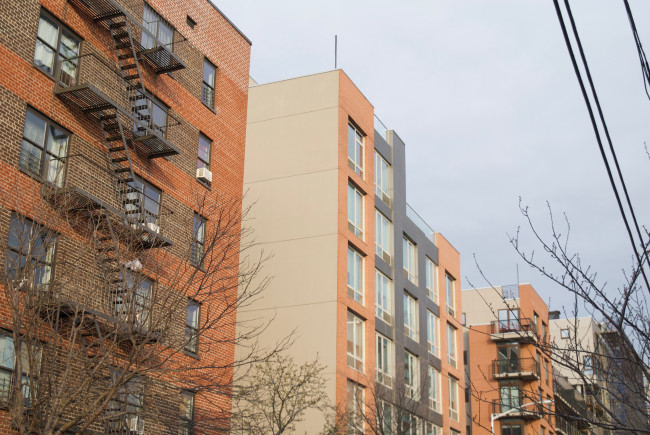How do we get a hoarder to clean up their apartment?

If you have a hoarder in the building, it’s important to find a third party who can help you work with the shareholder to resolve the problems.
Emily Myers for Brick Underground
“When you see signs of a hoarder, you urgently need to get a third party involved who will act for the benefit of the shareholder,” says Bonnie Reid Berkow, a real estate attorney at Adam Leitman Bailey, P.C. who has decades of experience representing co-ops and condos in New York City.
Berkow says this kind of behavior presents a danger to the occupant of the apartment as well as other residents in the building by creating a fire hazard and very often attracting pests like cockroaches and rodents.
In most cases, the hoarder is not aware that their living arrangement is presenting problems for the rest of the building.
“A first step in resolving the problem is to contact the shareholder and send a notice pointing out there have been complaints of odors and infestations and demanding they take immediate steps to correct the problem,” Berkow says. This is an appropriate step if you suspect the shareholder is hoarding but more broadly where the health and safety of residents is concerned.
Hoarding is a mental illness
The condition of hoarding was also once known as Collyers Syndrome, named after two brothers who died in their home in Harlem in the late 1940s when the junk they’d collected over 40 years collapsed on them.
It’s very common for hoarders to collect old newspapers, magazines, and items so the apartment will often be piled floor to ceiling with stacked material, leaving just a small pathway to get through the space.
“There might only be a very small living area left that’s unencumbered where the person might sit or sleep,” Berkow says.
Berkow says these situations are not limited to any particular area, or type of building, or type of person, although a hoarding problem can often worsen with age.
“Very often the people who suffer from this syndrome are elderly so don't have the ability or resources to clean their place and make it safe and habitable on their own,” she says.
Getting access to the apartment
A co-op board has the right to gain access to the apartment. Your board should have the super gain access to look at the condition of the apartment and consider the best way to eliminate bad odors and pests.
The bylaws will outline the notice you need to give for access. Usually reasonable notice is 24 or 48 hours.
“If the shareholder lets the super into the apartment, you can begin to evaluate the scale of the problem,” Berkow says.
More often than not, letters to the shareholder and notices will be ignored, in which case you may have to compel access via the court. This involves seeking a court order to gain access.
Involving a third party to help
While an eviction proceeding is an option for the board (see below), an approach that’s more sensitive to the mental health condition of the shareholder is to find a third party who can help you work with the shareholder to resolve the problems.
In some cases a board can seek the help of a family member or relative who can persuade the shareholder that they need to clear the junk from the apartment and give it a thorough cleaning.
“There are service providers dedicated to clearing the junk from the apartments of hoarders,” Berkow says. The shareholder may also be willing to move items to storage.
In the absence of a relative, you can reach out for help to Adult Protective Services, an agency within New York City’s Department of Social Services.
“They will attempt to reach out to the individual needing help and seek to engage the appropriate steps to resolve the problem,” Berkow says.
In some cases, you may have to ask the court to appoint a guardian for the shareholder who is hoarding, if the court feels the shareholder is unable to comprehend the seriousness of the problem. A guardian is a person or agency to whom the court gives authority to take responsibility for an individual and make decisions on their behalf. This will involve filing a petition in court.
“Testimony will need to be given so the court can decide whether it is in the person’s best interest to have responsibility for their care given to another,” Berkow says.
Berkow recently persuaded a housing court judge to order the clean up of a Bronx hoarder’s apartment based on the testimony of other shareholders in the building who complained that the public hallway smelled so bad they were embarrassed to have friends over.
They could also show that frequent efforts at extermination failed to solve the insect infestation problem in neighboring apartments. With the help of Adult Protective Services, Berkow arranged for the apartment to be cleaned and fumigated. The shareholder ultimately sold the apartment and moved to more suitable accommodation.
Solving the problem through eviction
As a last resort, a co-op board has the right to terminate the proprietary lease and remove the tenant shareholder for conduct that is in violation of the lease and has not been cured after notice.
“Typically, housing court judges will look to see whether the conduct is affecting other people in the building,” says Steve Wagner, Berkow’s partner at Adam Leitman Bailey, P.C. “Hoarding can often cause the public hallways to smell and cockroaches to come into neighboring apartments, so it can impact the entire building.”
An eviction and termination of the proprietary lease can either be accomplished after serving a notice to cure, or by terminating the lease for objectionable conduct in what is known as a Pullman Proceeding.
These proceedings can be time consuming for a board and in either event you will need to provide the proper notice to the shareholder and produce witnesses who can testify how the conditions are affecting their ability to live comfortably in their apartment. Hiring an attorney with experience in this area will put you in the best position to be successful.
New York City real estate attorney Bonnie Reid Berkow is a partner at Adam Leitman Bailey P.C.. She has more than 30 years experience representing co-ops and condos as well as individual owners and shareholders. Send Bonnie an email to ask about a legal consultation. To submit a question for this column, click here.
New York City real estate attorney Steven Wagner, a partner at Adam Leitman Bailey P.C., also has more than 30 years experience representing co-ops and condos as well as individual owners and shareholders. To ask about a legal consultation send Steve an email or call (212) 584-1973.
You Might Also Like
Sign Up for our Boards & Buildings Newsletter (Coming Soon!)
Thank you for your interest in our newsletter. You have been successfully added to our mailing list and will receive it when it becomes available.





















